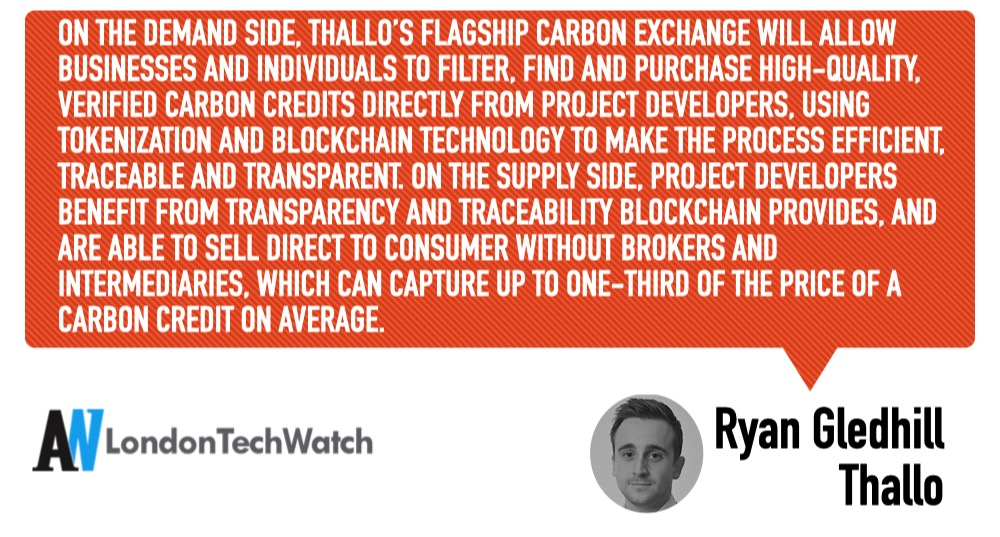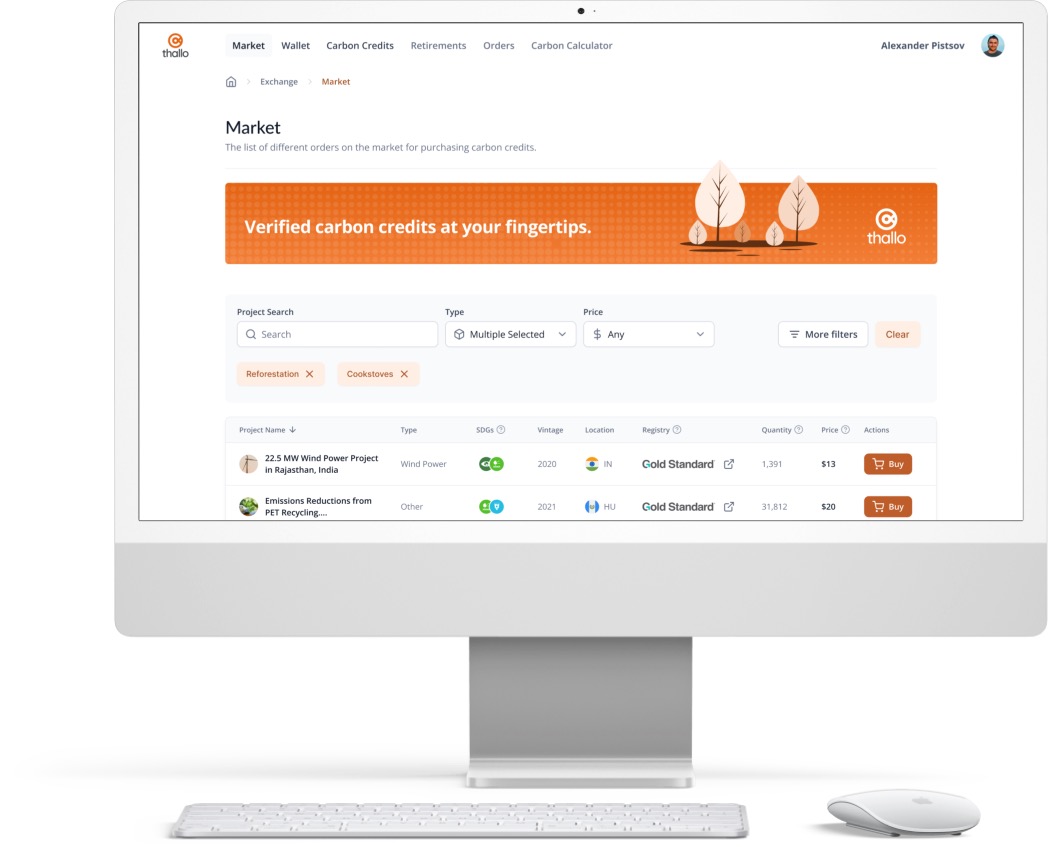Carbon offsets are used by corporations to decrease their environmental impact by purchasing “carbon credits” or investments in emission reduction projects that compensate for the emissions that the company creates elsewhere. This allows corporations to achieve their emissions and sustainability goals without disrupting their operations. However, finding suitable and reliable partners in the carbon offset market can be challenging. Thallo is a blockchain-based carbon credit trading marketplace. Building on the blockchain and tokenizing credits provides unprecedented traceability and transparency for this nascent carbon trading market. The voluntary carbon trading market is expected to reach $150B by the end of the decade, up from $2B in 2021. The projects on the marketplace are vetted to ensure that impact claims are accurate, alleviating concerns. The marketplace offers direct access to project developers, eliminating middlemen and unnecessary upward pricing pressures in the process.
London TechWatch caught up with Thallo CEO and Cofounder Ryan Gledhill to learn more about the business, the company’s strategic plans, recent round of funding, and much, much more…
Who were your investors and how much did you raise?
We raised a Seed round of $2.5M Our investors include enterprise blockchain and crypto company Ripple and lead investors Arcan LLC and Friendly Trading Group 2, as well as Allegory, Cerulean Ventures, and Flori Ventures.
Tell us about your product or service.
Thallo uses first-of-its-kind technology to revolutionize and democratize the carbon markets. We are building a blockchain-based exchange for businesses and individuals to purchase, trade and retire high-quality carbon credits. Thallo’s easy-to-use marketplace makes buying, selling and retiring credits as easy as buying stocks online.
What inspired the start of Thallo?
 My cofounder Joseph Hargreaves spent many years in the sustainability space, and when asked to delve into the voluntary carbon markets for a client, he saw their failures and pain points firsthand. We joined forces with web3 entrepreneur Adam Dry and climate veteran Hayley Moller to build a better marketplace using blockchain technology.
My cofounder Joseph Hargreaves spent many years in the sustainability space, and when asked to delve into the voluntary carbon markets for a client, he saw their failures and pain points firsthand. We joined forces with web3 entrepreneur Adam Dry and climate veteran Hayley Moller to build a better marketplace using blockchain technology.
How is it different?
There are other companies using blockchain to disrupt the carbon markets, but Thallo’s unique technology, such as our two-way bridging capability that allows tokenized carbon credits to be traded while maintaining the link to the underlying registry, truly sets us apart.
Further, we have a specific focus on carbon project developers, working with them to optimize the platform to enable them to capture value and scale up their critical work.
Unlike other blockchain entities, we use a non-commoditized approach, where we retain the characteristics of every carbon credit rather than putting like credits into a pool.
Unlike other exchanges, there is no minimum order, which means individuals can participate as well.
And unlike other marketplaces and brokers, we connect buyers directly to the sellers to trade, rather than buying from sellers and then charging a huge markup to buyers.
What market you are targeting and how big is it?
Thallo’s goal is to democratize and revolutionize the voluntary carbon market, which topped $2 billion in 2021 and is growing rapidly. We are primarily targeting companies that are looking to use carbon offsetting as part of their sustainability strategy. However, we’re also open to individuals using the platform, and are exploring innovative partnerships with web3 companies that may use carbon credits as a real-world asset backing their stablecoin reserves – an opportunity that could singularly scale the VCM to many multiples of the current addressable market.
What’s your business model?
On the demand side, Thallo’s flagship carbon exchange will allow businesses and individuals to filter, find and purchase high-quality, verified carbon credits directly from project developers, using tokenization and blockchain technology to make the process efficient, traceable and transparent. On the supply side, project developers benefit from transparency and traceability blockchain provides, and are able to sell direct-to-consumer without brokers and intermediaries, which can capture up to one-third of the price of a carbon credit on average.

How are you preparing for a potential economic slowdown?
Despite recent downturns, we see the carbon markets as relatively resilient in the medium term. In fact, corporations and other large organizations have set ambitious sustainability goals that they will need the carbon markets to achieve, while tier-one banks and funds are quietly building out carbon-specific trading desks to capture the opportunity. We are focused on building our flagship exchange and becoming the industry standard for tokenizing carbon credits.
What was the funding process like?
We were excited to receive interest from investors from around the world, and from both sustainability and the web3 VCs, as well as enterprise investors. Ultimately, we are very happy to have ended up with an investor slate that supports our team and our vision.
What are the biggest challenges that you faced while raising capital?
In the midst of our fundraise, macroeconomic conditions began deteriorating, including a major downturn in the crypto markets. These factors caused some VC funding to dry up and for sky-high valuations to come back down to Earth. For us, that was actually welcome, because it meant the investors left with capital to deploy were the ones who shared our long-term vision.
What factors about your business led your investors to write the check?
Our unique combination of both sustainability and web3 expertise make our team stand out to investors. Our combined track record includes decades of experience working with major corporates and international organizations on the front lines of climate change, while also including battle-tested tech and blockchain entrepreneurs who have previously exited to enterprise incumbents.

What are the milestones you plan to achieve in the next six months?
We are launching our exchange as well as debuting the first-ever two-way carbon bridge. We intend for this to be a blueprint for other partnerships, with Thallo being able to prove a “bridging-as-a-service” business for parties that can benefit from tokenization of carbon credits.
What advice can you offer companies in London that do not have a fresh injection of capital in the bank?
There are many ways to raise funds without Venture Capital. Consider crowdfunding platforms, grants (government and NGO), business/revenue loans, and do not underestimate the power of a strong advisory board coupled with accelerators or incubators – many of these entities have long-term relationships with venture capitalists and can get you ‘in the door’, even in difficult macroeconomic conditions.
Where do you see the company going now over the near term?
We see Thallo continuing to attract companies and project developers that want to use a better marketplace—which happens to be blockchain-based—to buy, sell and retire carbon credits.=
What is your favourite restaurant in London?
Sushisamba in Heron Tower. This is where the Thallo founding team had our first business meeting. My only tip is to ask the price of the champagne before ordering!




